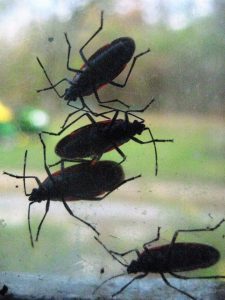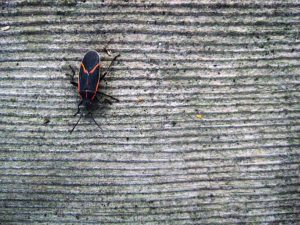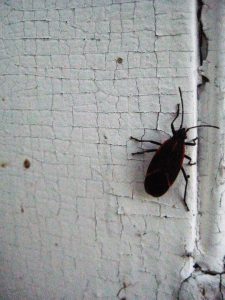They’re coming. Bar the doors. Seal the windows. They ’re on a mission to invade our homes, heading our way with the brainless obsessiveness of zombies. Hordes of them relentlessly approaching.
’re on a mission to invade our homes, heading our way with the brainless obsessiveness of zombies. Hordes of them relentlessly approaching.
It’s the attack of the box elder bugs.
These determined little insects show up just in time for the start of the Halloween season, in early October. They’re even attired in Halloween colors: black with a tasteful striping of orange.
But here’s the thing. These unwelcome trick or treaters are a nuisance, sure. They clutter up windowsills, crawl up walls, and generally creep you out. But they won’t eat your flesh. They don’t suck your blood. They don’t bite children, carry germs, cause disease, or make the dog itch.
They’re HARMLESS.
So what is a box elder bug, anyway? Box elder is a species of tree—very common in backyards and roadsides because it’s hardy and produces tons of seeds. It’s actually in the maple family, although the leaves are three-parted, looking more like poison ivy than maple. Box elder bugs eat box elder trees—they feed on the leaves and the dry, papery seeds, but don’t cause any significant harm to the trees.
But why do box elder bugs have this passionate desire to infiltrate our homes? Like us, when the days shorten and the air has a chilly bite, they start to think about a cozy spot to spend the winter. They hibernate under bark and logs in the forest, but even cozier are the nooks and crannies in windowsills, doorways, and eaves of our nicely heated homes.
They seek out warmth, and who can blame them? On a sunny fall day they’ll head for a wall with a southern exposure—more and more arriving till there’s a whole mob of them. If box elder bugs were tasty, they’d risk being devoured by birds, but apparently they have a very unpleasant flavor (only going by hearsay on this one) so they tend to get ignored unless the birds are really hungry.
It wouldn’t be so bad if the stupid insects would only stay out doors, but sometimes the more directionally-challenged box elder bugs get lost, and turn up inside your house. They don’t want to be there, though. The two things that make a box elder bug’s life worth living are not found inside your house—neither food nor sex. Box elder bugs don’t lay eggs or reproduce indoors, and I doubt there are box elder seeds in your kitchen for them to feed on.
doors, but sometimes the more directionally-challenged box elder bugs get lost, and turn up inside your house. They don’t want to be there, though. The two things that make a box elder bug’s life worth living are not found inside your house—neither food nor sex. Box elder bugs don’t lay eggs or reproduce indoors, and I doubt there are box elder seeds in your kitchen for them to feed on.
If you absolutely can’t stand the annual invasion, then grab the vacuum cleaner—just vacuum them up and goodbye. Don’t for heaven’s sake spray insecticides, either in the house, or on the trees. It’s not worth poisoning your surroundings for insects that cause far more nuisance than harm.
And if you’re a bird lover, see the above paragraph about the bad-tasting bugs not being eaten–unless the birds are really hungry. When it’s cold enough or food is scarce enough, birds and small animals will eat box elder bugs. They’re not as sweet as Halloween candy, but they’re a whole lot better than nothing at all.





Recent Comments